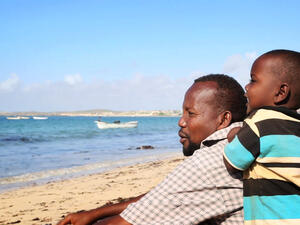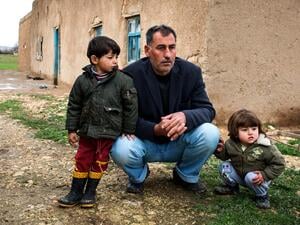More and more Liberians returning home from Guinea
More and more Liberians returning home from Guinea

Returnees from Guinea eat a hot meal after reaching Voinjama transit centre in northern Liberia.
MONROVIA, Liberia, July 20 (UNHCR) - Liberian refugees are returning home from Guinea in increasing numbers. On July 14, a UNHCR convoy carrying 761 refugees arrived at Voinjama in northern Liberia from camps around the southern Guinea town of Nzérékoré.
A week earlier, a similar convoy brought home 755 Liberians. They were the two largest convoys of returnees since the UN refugee agency launched its voluntary repatriation programme for Liberians in October 2004. The number of Liberians repatriated from Guinea with UNHCR stands at 37,547, including more than 17,500 this year alone.
Voinjama is located in Lofa County, one of the areas hardest hit during Liberia's 1989-2003 civil war. But around 60 per cent of all organized returns have come back to this area. The UNHCR office in Voinjama has received 137 convoys so far, including between 10 and 14 a month this year.
A lot of public and international attention has focused on the area, the bread basket of Liberia, and donors, humanitarian agencies and the government want to encourage returns here.
Since being elected in November, President Ellen Johnson-Sirleaf has been calling on her compatriots to return home from several countries in the region. "We take the return of a high number of people as a sign of confidence," she said recently, while warning of difficulties facing people after their return.
High returns to Lofa send a strong signal of hope to Liberians inside and outside the country. The last round of fighting in the civil war began in this northern region in 2001 and swept across the country, leaving 323,000 people internally displaced and forcing tens of thousands to flee the country.
More than 120,000 displaced people have returned to their homes in Lofa within the past year. To build on this, UNHCR has said combined reintegration efforts must continue smoothly.
High Commissioner for Refugees António Guterres visited Liberia last month and stressed the urgent developmental inputs this recovering nation needs, including employment creation and infrastructure rehabilitation.
UNHCR co-funded the recent rehabilitation of a 67-kilometre-long road linking Voinjama with Foya near the border with Sierra Leone. With good roads, repatriation can go ahead unhindered by such uncertainties as the weather.
With its partner, Peace Wind Japan, UNHCR has set up a shelter assistance programme aimed at helping the returnees. It also runs water and sanitation programmes, and education, health, agricultural and income-generating projects among others.
Meanwhile, the Liberia Humanitarian Mid-Year Appeal 2006 is asking donors to contribute an additional US$104 million to help fund humanitarian projects undertaken by non-governmental organisations and UN agencies.
A UN statement released by the UN Mission in Liberia said parts of the country still require urgent humanitarian help. "The majority of the population remains without access to adequate basic services including health care, drinking water, shelter and education. Many of them also face severe food insecurity. This situation is compounded by inadequate infrastructure, with many roads becoming impassable during the rainy season."
Funds were required for providing basic social services to vulnerable populations; revitalising communities to become sustainable, secure and productive; strengthening the capacity of civil society and local authorities to support recovery; supporting Liberian civil society; improving access through rehabilitation of roads and bridges: protecting vulnerable groups and combatting HIV/AIDS.









